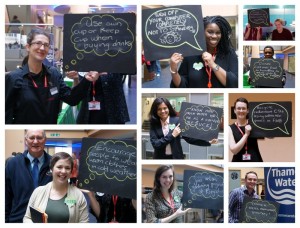[This guest post comes courtesy of Elle Harris, a 2nd year French and German Student who is also a member of Ecosoc, Fossil free and Urban garden projects and is a student rep for the Sustainable food steering group and is also president of KCL stop the Traffik. The views presented do not necessarily reflect those of King’s Sustainability]
From the offset I should just clarify, I am not a very good vegan. The King’s community contains many more impressive vegans who will truly wow you with their dedication to the cause, as opposed to my novice ways. That said, I feel I am in a unique and exciting stage of adopting a lasting vegan lifestyle i.e. the transition from vegetarian to vegan and can provide some confirmation that even the small steps are ok. So I feel my humble story can offer a refreshing outlook on how this whole veganism thing isn’t really as radical or scary as it sounds – it is surprisingly simple and makes a lot of sense!
Beginning with the start of the vegetarian lifestyle. After 18 solid years of eating meat, within the first month of university I decided to stop (which was surprisingly easy!). Despite years of watching horrific PETA videos, it didn’t seem to click that not eating meat was a logical response. Due to the questionable vegetarian options at my catered halls, I continued to eat fish, but my morals soon caught up with me and when I went home for Easter (and had more control in the kitchen), it was proper vegetarianism from then on. So, in terms of the veggie part of my life, it was primarily prompted in support of animal rights. Why kill a cow for dinner when there are SO MANY other things to eat that provide just as much satisfaction and nutrients?! I am not even a massive ‘animal lover’, but still, it just seems so absurd and unnecessarily greedy to eat meat in this modern day.
Moving swiftly on to the vegan ‘step’, I began at the end of January 2015 (so it wouldn’t get caught up in that New Years Resolution phase and become an immediate fail). Although vegetarianism was prompted primarily for the animal rights issues, my involvement within environmental groups last term introduced me to the environmental side of the meat industry. Watching ‘Cowspiracy’ finally pushed me to begin the transition, a film that puts the effects of the cattle industry on the environment in real perspective. It not only confirmed my vegetarian ways but also highlighted how the dairy and egg industry are just as bad.
To ensure this would be an actual lifestyle change, I started by being a vegan during the weekdays and then a vegetarian on the weekend (mainly to eat Quorn fajitas). The whole ‘Protein Problem’ that I was often bombarded with as a vegetarian is ever more present with veganism, but once more, it is misinformed. Granted I eat a lot of lentils and sweet potato, but this whole ‘restricted’ diet malarkey isn’t the case at all. There are so many fabulous recipes out there that makes vegan food fun. If anything I am more conscious of my protein intake, so I probably have stronger bones than meat-eaters who rarely eat fruit or veg. There are some unlikely perks of not eating meat too, for example, the limited veggie/vegan options on menus means I annoy my company less by being more decisive. Also, the feeling when you beat the system by discovering that something labelled as ‘vegetarian’ is actually ‘vegan’ is so rewarding that you will be put you in some ethical high all day. People often comment that such a lifestyle is costly. Granted, if you have a splurge at Wholefoods every week, this would apply (just like if a meat-eater went cray at TGI’s). However, with kidney beans at 30p a tin and a packet of rice lasting weeks, it is actually saving me a lot of pennies! It is also great for the environment. especially when comparing CO2 emissions, Oil and water use and land needed to sustain an omnivore diet to that of a vegan.
To sum up, I could literally ramble on for hours about reasons to go meat-free. It’s not in my nature to be that pushy veggie girl, but I hope this brief insight into my own vegan attempts shows that it is a journey that shouldn’t be rushed but rather, enjoyed – I get excited when I see soy yogurt on offer and the way to my heart is with a bag of hummus crisps. A poignant moment which confirmed that this is the right lifestyle for me happened over Christmas when I accidentally ate pork scratching, thinking they was just really salty breadsticks. Despite my initial horror, slips like this are okay. It proved my Eco and ethical ways are not just a university fad and veganism is the lifestyle for me. It is clear there is a lot of room for improvement in my own diet, but I hope I have demonstrated that even a switch to soy milk in your coffee is still a great step to eating sustainably. So, for the animals, the planet, your health, there are a wealth of reasons to go meat-free.







 Hi everyone, I’m Janne and I work with the Sustainability team as a Sustainability Projects Assistant. As I will be leaving the team soon off to a new job, I thought this would be a good time to share my experiences and reflect on working with the King’s Sustainability team.
Hi everyone, I’m Janne and I work with the Sustainability team as a Sustainability Projects Assistant. As I will be leaving the team soon off to a new job, I thought this would be a good time to share my experiences and reflect on working with the King’s Sustainability team.
